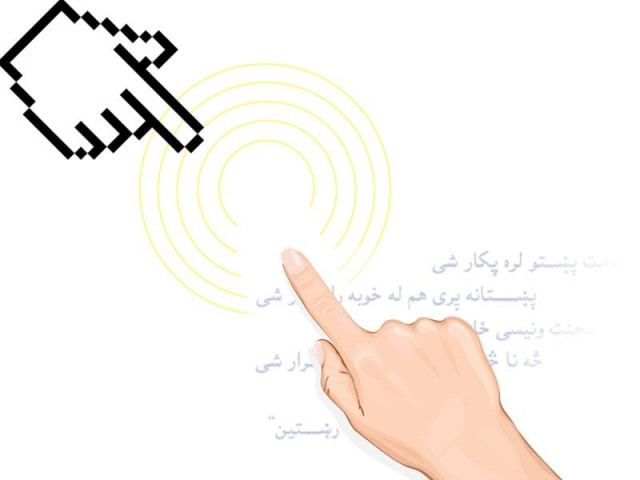Keeping Pashto alive: The last word
A web developer from Peshawar develops a digital, multi-purpose Pashto dictionary.

A web developer from Peshawar develops a digital, multi-purpose Pashto dictionary to keep the language alive. DESIGN BY KIRAN SHAHID
To bridge the existing linguistic gap in Pakistan between Urdu and regional languages, a young boy from Peshawar and three others have found a dynamic way to bring Pashto to speakers and non-speakers alike. Their unique online dictionary, thePashto.com, has gathered loyal users and a growing database.
After completing his Masters in Computer Sciences from City University Peshawar in 2011, 24-year-old Abdul Muqsit from Chamkani village (seven kilometers outside of Peshawar) collaborated with three of his colleagues to launch a software house called SoftEmblems. Though the original trio of colleagues moved to Kabul and Muqsit moved to the UAE for work, marking the end of the software house, he was soon joined by three others whom he met through the internet. Muqsit’s new team consists of Tayyab Khan, a Pashto poet based in Islamabad, Farhad Malakzai, a Linguistic Studies student in India, and Shafiq Gigyani, an MBA student in Peshawar, who now run the Pashto.com using their diverse linguistic backgrounds and expertise.

Abdul Muqsit, the web-preneur and Pashto enthusiast.
The Pashto dictionary is hosted by Pukhtoogle — Muqsit’s first successful digital project focusing on Pashto and Peshawar which now has the largest photo gallery of Peshawar and Pukhtuns on the internet with more than 1,500 pictures submitted by photographers and artists.
The Pashto dictionary aims to put Pashto on the linguistic map by allowing both Pashto speakers and non-speakers the chance to explore the language and its grammar. Allowing room for beginners, the handiest feature of the dictionary is the ‘Roman Pashto’ option, which allows users to spell Pashto words in Roman script and eliminates the need to learn the Pashto script.
There is another provision to cater for the differences between Pashto speakers. “There is conflict between Pukhtun tribes regarding dialect, so on the Pashto.com, we placed a section listing 114 tribes and allow for people to discuss the origin and history of the words to refine the list,” explains Muqsit.
With constant improvements and room for change, the Pashto dictionary now has over 16,000 word entries. “We get lots of new and missing words which were not present in the dictionary earlier, we keep adding them to the list once we have verified them,” he says.
Muqsit’s brainchild is not limited to everyday words and basic Pashto as it has room for more complex additions such as names and proverbs. “There are nearly 200 names for boys and girls with meanings on the website and more than 300 proverbs with translation and description,” he says.
Passionate about innovation, Muqsit first discovered his interest in computing when he swapped art for computer studies in the eighth grade after an NGO visited his school in the village. Despite failing to get admission into engineering for his bachelors, he went on to study computer science for his masters. Considering himself lucky in a country where education is not a right but a privilege, he notes that a lot of children miss out on opportunities to grow and innovate. “We just don’t have the resources to the nurture the extraordinary talent of these web developers in Pakistan. I would love to go back home and train, but the violence in Peshawar leaves me speechless.”

Keeping resource limitations and accessibility in mind, he shares his motivational secret. “I watch a lot of TED talks; they make me think over and over again about creating something unique. These talks are accessible to all and are full of ideas about technology and innovative design.”
He says his mission is not complete, but has a clear vision for the future. “As a web-preneur, I have a long way to go. I want to match the uniqueness of web services like Khan Academy, which is beneficial for visitors and of course, free of cost.”
Next steps
Android App: The Pashto dictionary has an Android app which can be found in the phone’s PlayStore for free.
Book: A New York-based publishing house, Hippocrene Books, will soon publish a hard form of the dictionary. Abdul Muqsit hopes that it will be available in print form within the first quarter of 2014.
Pashto language spellchecker: Abdul Muqsit wants to create the first ever Pashto language spellchecker and plans to launch it for the Android, iPhone and Windows.
Features of the dictionary
• Multi-search: The dictionary has a three-way search option where a word can be searched in Pashto to English, English to Pashto or in Roman Pashto.
• Auto-suggestion: If a non-speaker is confused about a new word, just typing the first two or three characters is sufficient as an auto suggestion pops up.
• Pashto Phonetic Keyboard: This keyboard (available on thePashto.com) allows a non-Pashto speaker to type Pashto without installing a script-specific keyboard. For example A can be used for alif and B for bey.
• Graphic User Interface & User Dashboard: There is a process to add new words or fix incorrect words on the dashboard. The submitted word is first verified, and then approved by the moderators.
• Pulse System: To cope with such digital menaces such as spamming and incorrect words, a pulse system was developed. If 20% of a user’s submissions have been incorrect, the system will freeze the account.
• Foreigner-friendly: There are more than 100 daily life sentences which were suggested by some foreigners in a previous version of the dictionary, such as “I am going to Peshawar” (za Peshawar ta zam).
Kamran Khan is a sub-editor on the Peshawar desk of The Express Tribune.
Published in The Express Tribune, Sunday Magazine, January 12th, 2014.



















COMMENTS
Comments are moderated and generally will be posted if they are on-topic and not abusive.
For more information, please see our Comments FAQ